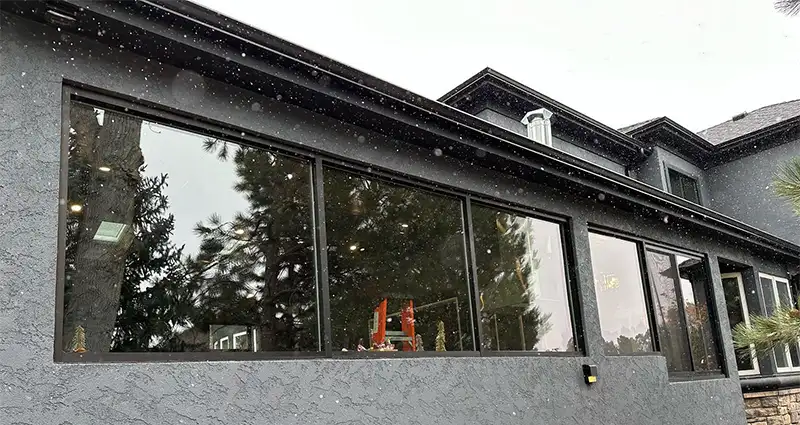Advantages and Disadvantages of Aluminum Replacement Windows
Aluminum windows are windows made with an aluminum frame, instead of a vinyl or wood frame. Aluminum framed windows are most often used in commercial applications, such as in commercial buildings and business storefronts. Commercial builders prefer aluminum framed windows as they are stronger, more durable, and last longer than other window frames. Aluminum is also more secure. However, aluminum is a better conductor of heat which makes them less energy efficient. Are aluminum replacement windows right for you? Keep reading to learn more.

Advantages of Aluminum Replacement Windows
Strength and Durability
Strength and security are priorities for commercial builders and storeowners. Builders want to build a building that’s strong and stable for their clients, and storeowners want a secure store – one that will keep thieves at bay. That’s why aluminum is the preferred choice for windows. The primary advantage of aluminum windows is their strength. Aluminum is three times stronger vinyl window frames. Once properly fitted to a window, an aluminum window is very tough to loosen or dislodge.
Price
Price is another advantage of aluminum windows. They’re not as expensive as wood windows, but are roughly the same cost as mid-to-high-end vinyl or fiberglass replacement windows. A new, high-end vinyl window costs around $1000, parts and labor. A new aluminum clad wood window, on the other hand, will cost between $1000 and $2000 to install. A new, common-size residential aluminum window will cost around $1000, window and labor.
Maintenance
Low maintenance is another big advantage of aluminum windows. Aluminum windows require little maintenance by comparison to other window frame materials. Wood windows can swell in humid environments. When a wood window swells, it’s difficult to operate. Aluminum doesn’t swell in humid environments. The opposite is also true in dry environments. Aluminum windows won’t shrink in dry environments. Because wood swells, when painted, the paint flakes off, therefore requires periodic repainting. Aluminum, on the other hand, doesn’t require repainting from swelling since it doesn’t swell. Aluminum windows are also very resistant to rust, cracking, splitting or shrinking.
Market Share
Aluminum windows have a huge market share when it comes to commercial buildings. As stated above, commercial builders and commercial building owners prefer aluminum windows due to their strength, durability, security, and longevity. As for the residential market, aluminum window’s share of the market has dwindled significantly over the past 20 years. More homeowners are preferring the low-cost advantage of vinyl windows, or the warm look of wood windows. Homeowners are also preferring the energy efficiency of vinyl and wood windows.
Noise
Because aluminum windows have more mass than vinyl windows, they will stop more external noise from reaching the interior of a home. Aluminum is nearly 3 times heavier than vinyl, and much stronger.
Slim
For the most part, aluminum windows are nice looking, although it is somewhat industrial or commercial looking compare to vinyl replacement windows. Aluminum windows offer a sleaker look thanks to their slim architecture. Vinyl and wood windows require a thicker frame because they aren’t as strong as aluminum. Aluminum windows can afford to be thinner because the material is stronger. As a result, with an aluminum window, you see more window and less window frame.
Styles
Although aluminum windows aren’t offered in as many styles as, for example, vinyl, they are available in all the popular ones. Marvin offers aluminum windows in awning, casement, glider, single-hung, picture, and picture speciality shapes. Andersen offers aluminum windows in casement or picture. Pella offers vinyl windows in double-hung, single-hung, sliding, casement, and awning.
Colors
Aluminum windows are available in a variety of colors. Andersen, for example, offers aluminum windows in 5 colors, including clear anodized, black bronze anodized, colony white, dusk bronze, and black. Milgard offers 4 interior and exterior colors. Marvin offers aluminum windows in 10 colors, including bronze, black, and white, as well as wood patterns such as English Oak and Walnut.
Recyclable
Perhaps an unknown advantage to aluminum windows is that they’re recyclable in Colorado. Vinyl is not. This makes aluminum windows a more eco-friendly option.
Disadvantages of Aluminum Replacement Windows
Energy-Efficient
The big disadvantage of aluminum windows is that they’re a great conductor of heat. As a result, they’re a poor choice when it comes to energy-efficiency. For this reason, aluminum windows are used primarily for commercial buildings and applications. Many builders are willing to sacrifice the heat loss/gain for the strength that aluminum window frames offer for large window openings.
Availability
Full aluminum windows (not aluminum clad wood) are becoming less available for residential applications, due to the energy efficiency being required by local municipalities. Although aluminum window manufacturers are less common than vinyl window manufacturers, there still are some. This isn’t necessarily a disadvantage of aluminum windows, but it’s worth noting. The good news is, these are window manufacturers you already know and trust. Aluminum window manufacturers we carry are Andersen, Marvin, and Milgard. In fact, we’re an Andersen Certified Contractor.
The Bottom Line
If you don’t mind spending a little more money than you would on average vinyl windows, and you’re wanting a window that’s low maintenance, strong, durable, and long-lasting, consider aluminum. If energy-efficiency is your primary concern, consider aluminum clad wood windows. Aluminum clad wood combine the best of both worlds – they’re energy efficient, recyclable, durable, and long-lasting.
